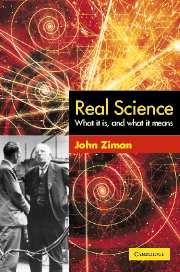Book contents
- Frontmatter
- Contents
- Preface
- 1 A peculiar institution
- 2 Basically, it's purely academic
- 3 Academic science
- 4 New modes of knowledge production
- 5 Community and communication
- 6 Universalism and unification
- 7 Disinterestedness and objectivity
- 8 Originality and novelty
- 9 Scepticism and the growth of knowledge
- 10 What, then, can we believe?
- Endnotes
- Bibliography and author index
- Index
1 - A peculiar institution
Published online by Cambridge University Press: 24 August 2009
- Frontmatter
- Contents
- Preface
- 1 A peculiar institution
- 2 Basically, it's purely academic
- 3 Academic science
- 4 New modes of knowledge production
- 5 Community and communication
- 6 Universalism and unification
- 7 Disinterestedness and objectivity
- 8 Originality and novelty
- 9 Scepticism and the growth of knowledge
- 10 What, then, can we believe?
- Endnotes
- Bibliography and author index
- Index
Summary
Defending a legend
Science is under attack. People are losing confidence in its powers. Pseudo-scientific beliefs thrive. Anti-science speakers win public debates. Industrial firms misuse technology. Legislators curb experiments. Governments slash research funding. Even fellow scholars are becoming sceptical of its claims.
And yet, opinion surveys regularly report large majorities in its favour. Science education expands at all levels. Writers and broadcasters enrich public understanding. Exciting discoveries and useful inventions flow out of the research laboratories. Vast research instruments are built at public expense. Science has never been so popular or influential.
This is not a contradiction. Science has always been under attack. It is still a newcomer to large areas of our culture. As it extends and becomes more deeply embedded, it touches upon issues where its competence is more doubtful, and opens itself more to well-based criticism. The claims of science are often highly questionable. Strenuous debate on particular points is not a symptom of disease: it signifies mental health and moral vigour.
Blanket hostility to ‘science’ is another matter. Taken literally, that would make no more sense than hostility to ‘law’, or ‘art’, or even to ‘life’ itself. What such an attitude really indicates is that certain general features of science are thought to be objectionable in principle, or unacceptable in practice. These features are deemed to be so essential to science as such that it is rejected as a whole – typically in favour of some other supposedly holistic system.
- Type
- Chapter
- Information
- Real ScienceWhat it Is and What it Means, pp. 1 - 11Publisher: Cambridge University PressPrint publication year: 2000



